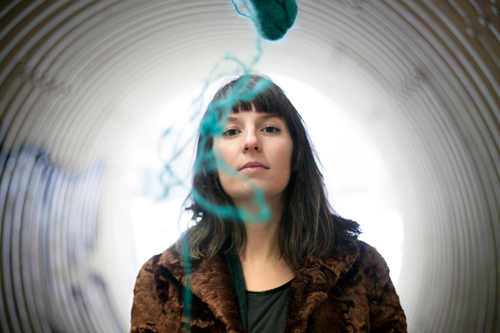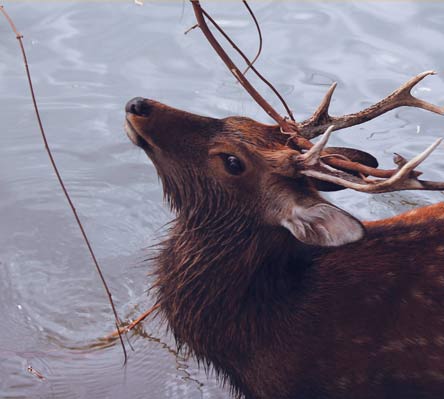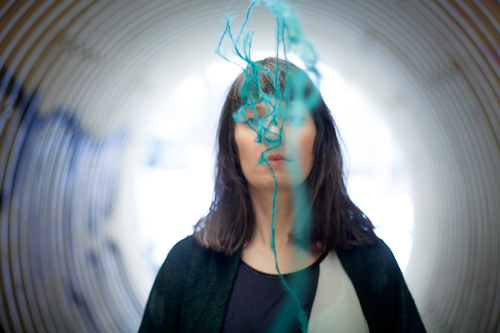After we were charmed and almost hypnotized by the beauty of her amazing second album, simply titled ‘two’ (coming out of the Bergen-based label Playdate), we had a chat with Eva Pfitzenmeier, better known as By The Waterhole, her solo-project with which she wisely intertwines jazzpop and bluesy nuances, association-filled poetry, blossoming melodies and her evocative voice within a personal definition of loop-based music. Enjoy the reading and, possibly, the listening…
Chain D.L.K.: Hi Eva! How are you?
By The Waterhole: Very well, thanks! Tired, though (with a 3-month old baby in the house, that’s rather natural I guess…).
Chain D.L.K.: Let’s look back before speaking of current events and a hopefully bright future… what’s the most remote memory related to music you have (besides the maternal bass)?
By The Waterhole: Probably my dad playing the piano (a lot of jazz standards, Bach and Schubert is what I remember best) and a stuffed animal in the shape of a ladybug with a music box inside. Unfortunately, I don’t remember what tune it played, but I remember that I loved it soooo much!

Chain D.L.K.: I wrote that you started singing in churches when you were a teenager. Do you think that religious beliefs or some sense of belonging to a community could help in getting closer to art in general?
By The Waterhole: That’s not entirely correct. I did sing in churches, but that was when I was very young (maybe 6 or 7 years old) – and then just as the “audience.” Back then I liked going to church, only because of the fact that there would be singing involved. The rest of the service I found rather boring…
As a teenager I sang in churches occasionally, but not because I was religious, but because I really liked gospel – the energy and the bluesy, improvisational character of it.
I think it’s often rather the other way around – art helps create a sense of belonging and community. I also think that this is exceptionally true for music. Music is perceived differently than, for example, visual art, and has a much more direct way into our emotions, which again play a very important part in feeling a connection with others.
Chain D.L.K.: You are German, but you perfectly integrated into the community of the wonderful Bergen. Would you say that lovely town and the Norwegian community had an influence on your artistic path and choices?
By The Waterhole: Yes, for sure! After finishing my studies in Amsterdam (I studied jazz singing at the conservatory) I was looking for a new direction, not feeling at home anymore in the world of jazz chord progressions and scatting. I’m not sure if the Norwegian music scene has necessarily influenced me a lot music-wise, but it definitely has mentality-wise. I find that people are open-minded and up for all kinds of experiments – not only in the sense of, for example, going completely avant-garde, but maybe also rather going very simple.
Bergen is known for its DIY rock milieu; there is a great energy there. Also, the avant-garde milieu is quite down to earth and not pretentious or snobbish at all; I like that. The fact that the town is rather small is inspiring, too, in the sense that you easily get to know a lot of people from different milieus, be it pop, sound art or contemporary music.
Chain D.L.K.: Could you tell us something about the most important meetings in your musical history for your growth? I’m referring to meetings with other people involved, or those not into music, that could be considered milestones for your artistic/musical growth…
By The Waterhole:
– My dad, taking me to a lot of concerts as a kid and introducing me to a lot of different types of music.
– A singer that taught at a jazz workshop I went to. Unfortunately, I don’t remember her name. From her, I heard for the first time of the possibility of live looping; that must have been in 2001 or so. It was still a couple of years until I got my first loop station, but this introduction to sampling the voice was relevant to my musical development.
– My fiancé and producer, guitar player and composer Stephan Meidell, who introduced me to a whole new musical world when we met ten years ago, and who has always encouraged me to find my way.
Chain D.L.K.: Well…maybe someone already asked you, but what’s the origin of the name you’ve chosen for your solo-project By The Waterhole?
By The Waterhole: I don’t exactly remember how the name finally evolved out of an extensive brainstorming session with me and myself (this is how it goes with solo projects…), but I liked the picture that came to mind: a well or a waterhole where many different kinds of animals meet to drink, the animals representing many different musical influences and styles. I like many different types of music and don’t like to be restricted to one particular style or genre.

Chain D.L.K.: Would you say there’s a connection with Krachmacher (besides your presence) with By The Waterhole?
By The Waterhole: I think it’s unavoidable to have a connection, seeing that I write (with Krachmacher, together with my bandmates) and sing the music. That being said, By The Waterhole developed from the urge to have a project where I can use my voice and do vocal experiments in a “quieter” environment and with full creative control. It is great fun playing with Stephan (guitar) and Øyvind (drums) – there is so much great energy, and they are both amazing musicians. But as a vocalist – especially when playing in crappy venues that don’t have the best equipment or sound technicians, I sometimes felt easily drowned out. I guess every band vocalist knows the problem of not being able to hear a note of what they’re singing… So I wanted to have a project as a balance to that, and as an experimental platform for my ideas and my voice. I do play rather loudly with By The Waterhole as well, but I have better control over it. A connection is a way of making the lyrics and the music; there is a lot of improvisation involved. I also see an aesthetic connection – the wanted small imperfections, the melody lines… I’m curious, what connection do you see?
Chain D.L.K.: Textures of your music are very simple, and even electronic devices are not so treated, as it’s easy to recognize the source of some sounds, and you didn’t remove what other electronic composers would have considered a mole (the hiss of machines sounds a constant element, and analog sounds come as they are)… why did you choose such a “simple sophistication” in your sound?
By The Waterhole: I like a certain imperfection in my work. Nowadays it has become so easy to produce “perfectly clean” music. However, for me this music is often lacking the authenticity and honesty that you can find in older recordings, for example from the 60s and 70s: soul records where the vocals at a certain point are so powerful that they peak, rock records where you can hear the amp buzzing, jazz records with slightly fucked up solos that then sound even better than the slick, 10th-take-solos that are maybe even edited together – these things make you feel like you are actually in the same space where the music is happening. It’s so much more alive. So, often I choose to leave things the way they sound in real life – for example, keeping the background noise buzz in a sample that I record with my sampling keyboard. Some of these imperfections on the record result from sound material I collected, and some of it was a conscious choice of my co-producer, Stephan Meidell, who also mixed the record. He has a great sense for these small details and understood that with keeping these sounds that “happen” unintentionally, and maybe even lifting them up rather than trying to hide them, the arrangements gain interesting extra elements, since there is space for them in the minimalistic instrumentation of By The Waterhole – to give it a feeling of authenticity, of analogue textures in a digital world, and to give it a certain warmth.
Chain D.L.K.: On the other side, it’s pretty amazing the way you counterbalanced such simplicity with your voice… what’s the role of it in your sonic soup?
Artist Name: For me, the voice is still the most important element. The play with vocal textures and sounds, the melodies and the lyrics. I wish people would listen to lyrics more carefully… I know it’s difficult to hear and understand everything, so that’s why I included a nice booklet poster with the lyrics and artwork in this release.
Chain D.L.K.: Besides effects, what’s the funniest electronic trick or sound by which you try to camouflage your voice?
By The Waterhole: On the record, I used a good old-fashioned tape recorder to record some of the vocals in real-time and then play them back and record again in the studio (on “I fall”). In the last couple of years, I have used tape recorders in several music and theater projects. I like the live use, the playing back, rewinding, forwarding, improvising in this manual and tactile way to create a sound scape.
Another fun fact from the production of “two”: the bass drum in “i want to” is a lampshade (those big old-fashioned ones made out of fabric stretched over a metal frame) played on with chopsticks. We were amazed by the deep bass drum sound it created when putting a microphone inside the lampshade.
Chain D.L.K.: Would you introduce ‘two’ in your own words?
By The Waterhole: Two is an eclectic record. Not quite as eclectic as my first solo record, “one,” but still merging many different influences. Blues and experimental pop meet more conceptual spoken-word songs and African-inspired rhythms. It’s very personal and a solo record in every sense (me writing and playing/singing everything, yet with artistic help and support from co-producer Stephan Meidell).
Chain D.L.K.: I noticed a bluesy nuance in some songs (particularly in Rollin’, one of my faves, or I Want To)…is it intentional?
Artist Name: Oh yes, very much so! At the age of about 11 or 12, I started to listen a lot to Billie Holiday (still my absolute favorite vocalist), Janis Joplin, Jimi Hendrix, and two blues records I had by Jesse Fuller and Brownie McGhee. I loved it!
(Of course, I also listened to music that was popular at that time, those more or less embarrassing pop and dance jewels of the 90s, which I will leave unmentioned here…)
I’m still very fond of the real authentic old-school blues (not the modern blues rock, that’s not my thing at all), the simplicity of it. So this has been a strong influence that I finally dared to give into after having deserted it for a while during my studies.
Chain D.L.K.: What’s the more or less hidden meaning of another highlight of ‘two’ such as ‘the loudness of no sound’?
By The Waterhole: I wrote the lyrics to this song when my grandfather died. However, I think everybody can make their own meaning of that text; just listen closely, take it in and interpret it in your own way.

Chain D.L.K.: Some songs like ‘I Fall’ seem to have been written while you dig into the electronic elements you melded….was it born as I guessed?
By The Waterhole: Well, the text existed already before I made the music. I usually work in an improvisational way, using elements that I have “lying around” (texts, riffs, rhythms or melodies), mixing them together; then I see what fits, adjust, rewrite, improvise, add, take away… This is also how this song came to be. However, this one was stitched together in the recording studio more than others, testing and layering different electronic elements. (Most of the other songs are more exactly recorded how I play them live.) It is still a very simple and minimalistic composition.
Chain D.L.K.: Have you brought ‘two’ on live stage yet? If so, any interesting feedback?
By The Waterhole: Most of the songs from “two” I have played live, yes, but not all. I have gotten quite some positive feedback (see, for example, this review, so far unfortunately only in German, hoping to get around to translating it soon: http://www.nrwjazz.net/reviews/2016/Frische_Ideen_beim_20._Joe-Festival_/). Often people seem taken by the performance (the music and the video, which is an important part of By The Waterhole live) but also a little confused, kind of like waking up from a dream with a lot of different impressions that they don’t quite know what to make of yet. I was told several times by audiences that they hadn’t heard anything like it and didn’t quite know what to compare it to/which drawer to put it in. To me, that’s a huge compliment; I’m always very happy to hear that!
Chain D.L.K.: Any work in progress?
By The Waterhole: Always! 🙂
Suddenly you might hear a new song at a concert!
visit By The Waterhole on the web at: www.bythewaterhole.com

